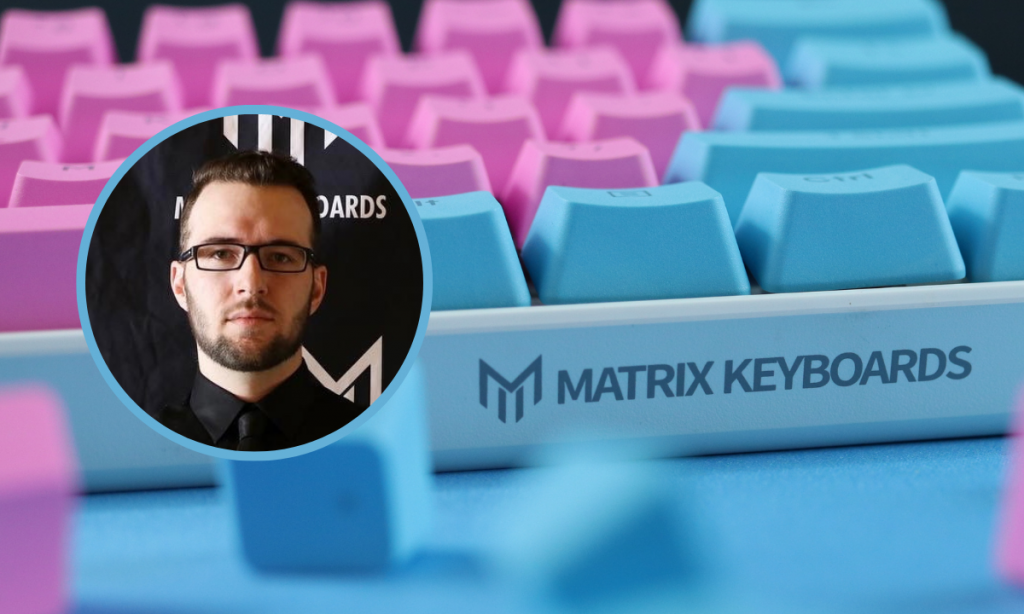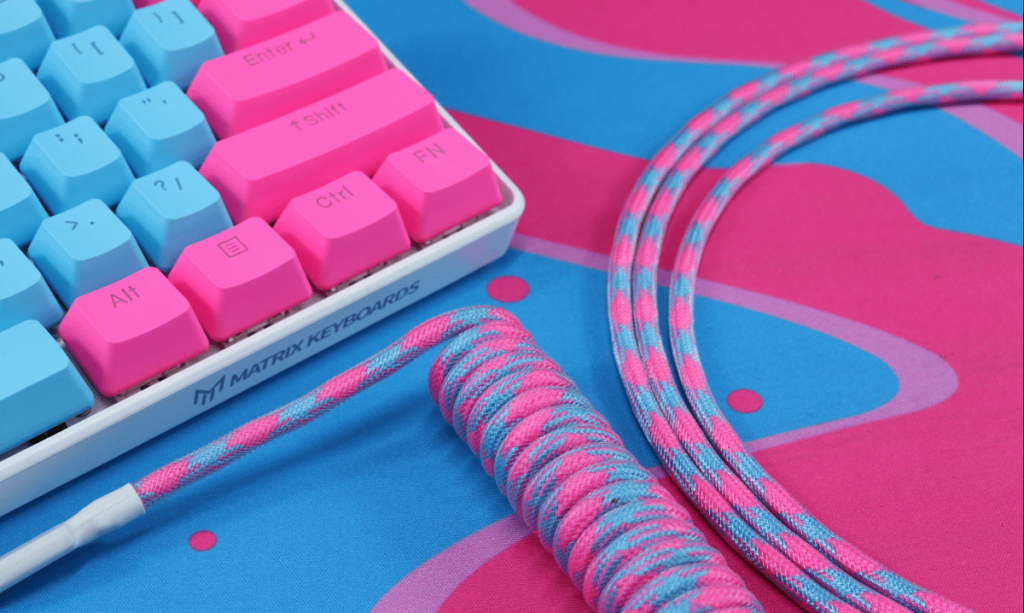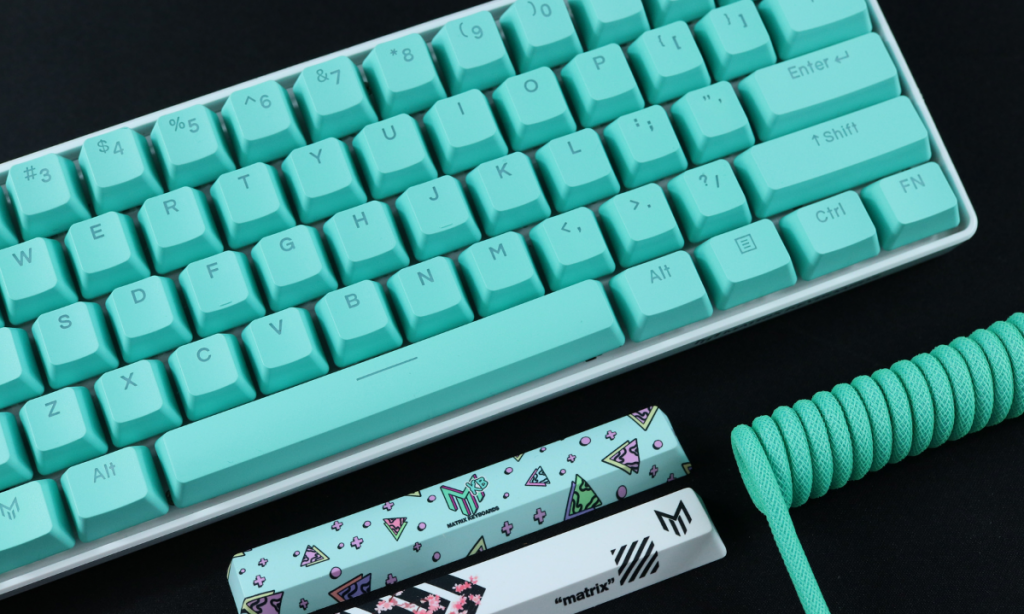The distinguishing clicking and clacking sounds of mechanical keyboards have seen a grand resurgence in the last couple of years. With 100 Thieves’ recent acquisition of mechanical keyboard company Higround, recent weeks have seen a lot of talk about the future of the keyboard industry.
Fortunately for keyboard fans, they are spoiled for choice. Esports Insider talked to Chris Horne, CEO of Matrix Keyboards, about the in’s and out’s of the keyboard market.

RELATED: 100 Thieves acquires peripherals brand Higround
Launching a high-performance keyboard brand is not an easy task. Apart from the heavyweights like Razer and Corsair (who are now exploring smaller-sized keyboard that enthusiast companies like Ducky used to dominate), there’s a number of other smaller manufacturers. So how do you build a brand that sets itself apart from dozens of others and stays relevant?
Horne explained that the idea behind Matrix Keyboards came from his business partner, Cody Hyman. It was simple: a compact mechanical keyboard with esports-focused features and great customer support. After researching the market, the business model revealed itself: 60% keyboards designed for esports players.
“What we revolved around was that niche 60% keyboard, which we knew [would] be very popular in the esports space where a lot of flicks and swipes need to happen. You also only have so much desk space at these LAN events, so that’s how it got started. From that we just kind of grew and expanded.”
Being an extremely small manufacturer, the company took to organising its own esports events, especially in Fortnite, to get its name out there. The tournaments were organised before the Fortnite World Cup in 2019, and there was a lot of attention from the professional Fortnite players in the region. This was the main driving force behind the company’s relatively fast growth in its early days, Horne explained.
“We had hundreds of pros showing up to our tournaments because people were saying, ‘hey, Matrix Keyboard tournaments are the best tournaments to practice for the World Cup’.
“And then the World Cup happened and Bugha won. No more than a week after he won, he started using our Elite Series keyboard, and that’s kind of when our name was put on the map. Other professionals started recognising what we were doing and organically liking our keyboard.”

Tapping into a competitive market
It is no exaggeration to say that the gaming peripherals market is on the rise. The pandemic actually helped grow the industry, and everything looks set to continue in an upward direction. Matrix Keyboards tried to position itself as the premier manufacturer of esports-focused 60% boards, but that narrowed down their target audience even more. The company wasn’t just making mechanical keyboards, it was making mechanical keyboards in a form that lots of people didn’t even know existed.
“We knew there was a market for 60% keyboards and Ducky seemed to be the only manufacturer at the time that was capitalising on the new hype of 60% keyboards. We felt with our gaming experience and knowledge of esports, we could make a name for ourselves in this community as a premier esports brand,” Horne explained.
Even though Horne’s company started with professionals, he found that the esports and gaming markets are growing so fast that the ‘everyday gamer’ still makes a perfect buyer.
Horne added: “Someone who comes home from school and just loves playing video games – even though we did initially find that niche of competitive gamers, we’ve seen the growth of esports and also seen the growth of generic games.”
Moreover, Horne told Esports Insider that there’s a massive appeal to using limited edition gear that the professional gamers are using in tournaments, and compares that with sportswear worn by athletes such as the late Kobe Bryant and others. Once fans see the shoes the athletes are wearing, those become sought-after collectible items.
The same goes for keyboards – when Faker uses a Matrix keyboard on stream, his fans want to know where to get it and buy it to follow in his footsteps. “It’s really nothing new,” Horne said.
RELATED: Bad Moon Talent enters deal with Matrix Keyboards

Nike as an inspiration
A big motivator for Matrix Keyboards was sportswear brand Nike and other similar known brands in traditional sports. Horne shared that Matrix looked at the way Nike approached Michael Jordan and their partnership and tried to make similar things happen in the keyboard market.
Considering, however, that this is a densely populated market, Matrix did not want to oversaturate the space with too many collaborations. Rather, it signed the ‘top one percent of professionals’.
“We found Clix who is one of the best Fortnite pros, Symfuhny, one of the best Call of Duty pros, and Faker, an absolute legend in his regard. We see a strong ability to provide the gaming community with premium signature keyboards designed by their favorite professionals.”
“So for Matrix being a smaller company and coming into a saturated market, we wanted to make a splash and really put our mark in the industry where we can offer something that nobody else is.“
Matrix Keyboards is aware that there are some bigger names in the industry that are following a similar approach, such as Scuff and HyperX. But what sets the company aside, Horne said, is that Matrix focuses on only partnering with the absolute best in every game.
Since the market is steadily growing, and even smaller keyboards are making big sales, Matrix Keyboards and similar ‘boutique’ manufacturers are innovating and finding new ways to set themselves apart from the larger and richer brands in the gaming peripherals sector.
[primis_video widget=”5182″]

